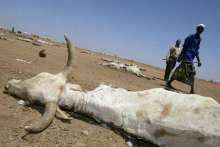Climate change can stoke Africa conflicts
|
- By Daniel Flynn, Ghana
Climate change in Africa could leave 250-million more people short of water by 2020, spurring conflicts and threatening stability on the world's poorest continent, according to the 2007 Nobel Peace Prize winner.
Rajendra K Pachauri, chairperson of the United Nations panel of climate experts who shared the prize with former United States vice-president Al Gore last year, said the responsibility lay with wealthy developed nations to curb their carbon emissions.
"If the situation in Africa is a scar on the conscience of the world, then if the world has a conscience it has to remove that scar," Pachauri told Reuters in an interview.
"Reasons of equity and ethics clearly require that developed countries must do more and there is also an issue of enlightened self-interest, because you cannot have a large continent like Africa being neglected," he added, speaking on the sidelines of a UN trade and development conference in Ghana.
The Indian scientist warned that Africa's one billion people were among the most at risk from climate change because of the existing environmental pressures on the continent caused by lack of food and water, desertification and flash flooding.
"Unfortunately, the impact of climate is going to be most likely so harmful that it would threaten governments," he said.
"With water scarcity, the threat of conflict and the threat of competition for scarce resources will grow substantially and all of these are incompatible with good governance."
Pachauri, head of the UN Intergovernmental Panel on Climate Change, cited research showing that by 2020 between 75-million and 250-million people in Africa would be suffering from additional water stress due to climate change.
Farmers who depend on rain-fed agriculture were likely to see declines of 50% in their yields by 2020, he warned.
Wars over food and water
In recent decades, wars in the Democratic Republic of Congo, Liberia and Sierra Leone have involved battles to control valuable mineral resources, such as diamonds, gold and coltan.
Pachauri said in the future water and food could be the most valuable resources. Some experts already link the conflict in Sudan's Darfur to competition over access to food and water.
"Climate change has the potential to be a problem for the maintenance of peace," he said.
"You'll have movement of populations, which of course carries with it the seed of conflict, accentuated by the fact that there would be a lack of food availability in general."
A dramatic rise in global food prices this year, which has sparked unrest from Africa to Asia and the Caribbean, has topped the agenda of the UN conference in Ghana.
Pachauri said there was a risk of Africa falling into a vicious circle, where good governance was needed to alleviate poverty but climate change and resource competition fostered conflict and corruption.
"What is the answer? The answer is for developed nations to realise that we are living on one planet. We are all inhabitants of Spaceship Earth," he said.
Pachauri hoped Western governments could agree on a mechanism for carbon pricing under the Kyoto agreement by the end of 2009, which would give a major boost to low-carbon technologies and sharply reduce emissions.
"But we are nowhere close yet," he said.
Developing countries, for their part, should also move away from centralised, energy-intensive infrastructure to a model more suited to their conditions, Pachauri said.
Source: Reuters News Service




